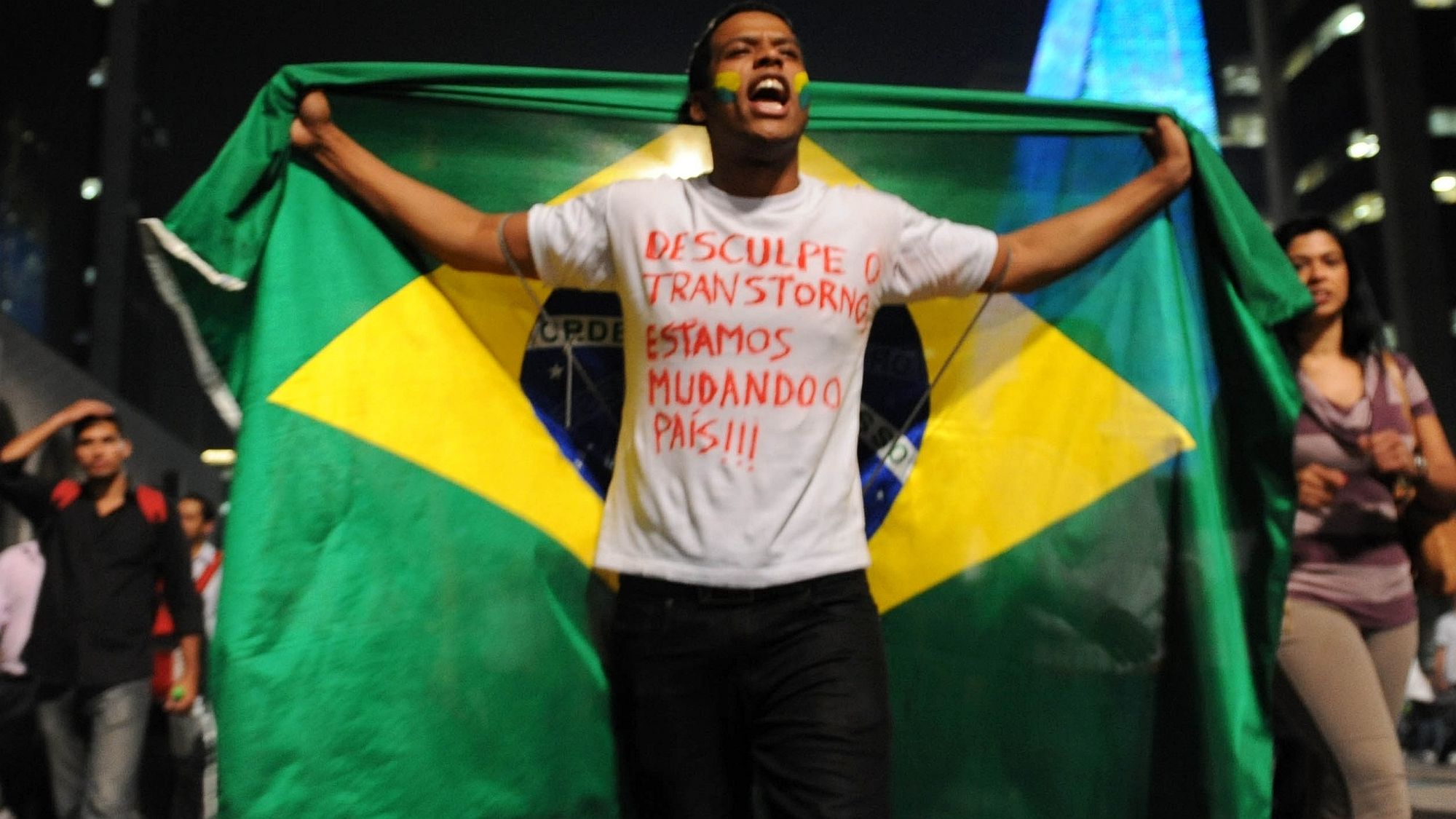
People increasingly use social media platforms like Facebook and Twitter as their primary source for news and information. Studying social media habits, therefore, can offer rich insight into the political opinions of a nation.
Our team of computer scientists and social scientists from Brazil’s University of São Paulo began analyzing individuals’ Facebook behavior in 2015.
We started in our home country, where Facebook is a favored social media network: 52 percent of urban Brazilians consume their daily news on the site. Approximately 12 million Brazilian Facebook users interact with political pages on the platform.
By plotting those users’ interactions with such pages – those belonging to a government official, social movement or advocacy organization, for example – we developed a nationwide map of how Brazilian political opinion has changed over the past three years.
The visual that emerged was a shocking portrait of political polarization in action. We are now expanding our research to focus on other polarized nations, including Argentina and the United States.
Brazil before 2013
We tracked which pages these 12 million Brazilians had liked over the course of a month, noting when groups of users liked different pages on similar topics.
In 2013, our research found that Brazilian Facebook users with political interests could be categorized into six “user communities” based on the types of pages they visited: (1) conservative politicians and parties; (2) left-wing politicians and parties; (3) hard-line anti-crime groups; (4) anti-corruption campaigns; (5) progressive social movements; and (6) human rights and environmentalism.
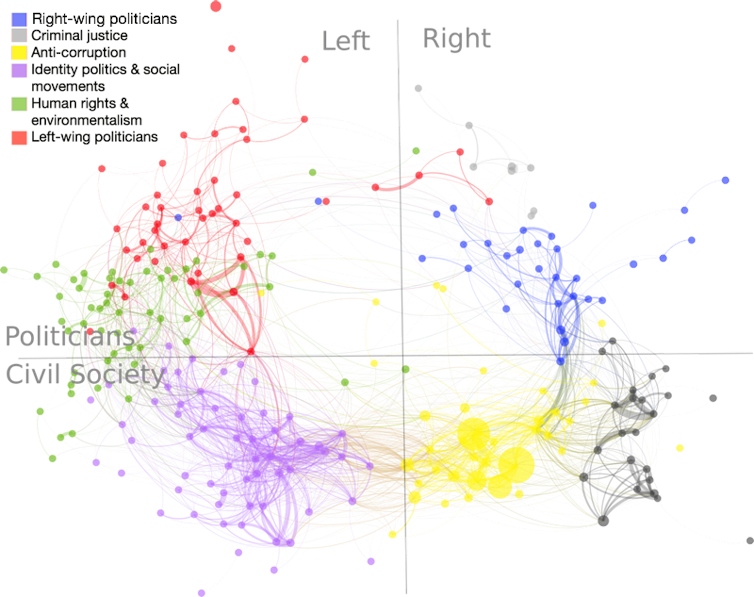
Pablo Ortellado and Marcio Moretto Ribeiro, CC BY
In 2013, these six discrete Facebook user communities fell neatly along two axes, from the political left to right and from followers of political groups to participants in civil society organizations.
Though there was a clear difference between the online behavior of people who followed left-wing and right-wing politicians in Brazil in 2013, the distance between leftist and rightist social movements was not so vast.
In fact, there was enough overlap between two user clusters – Brazilians interested in progressive social movements and Brazilians interested in the anti-corruption movement – that these “communities” nearly formed a continuum. Many Brazilian LGBTQ supporters also affiliated with the anti-corruption movement back in 2013, and some anti-corruption crusaders were interested in environmentalism, too.
March 2014
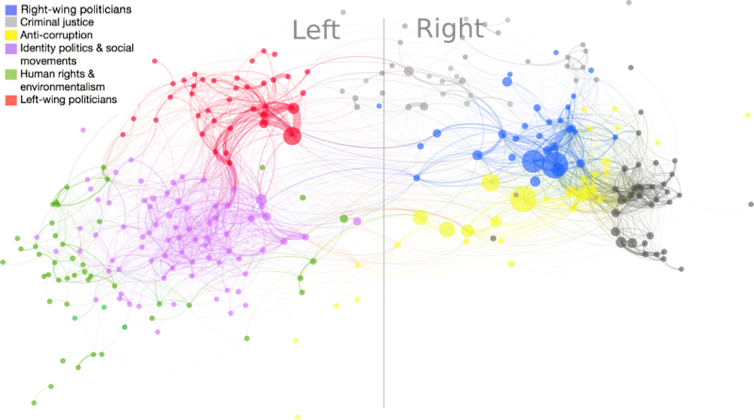
Pablo Ortellado and Marcio Moretto Ribeiro, CC BY
That changed after a series of spontaneous, massive protests erupted in Brazil in June 2013, fracturing Brazilian society.
Protests began when some residents of São Paulo and Rio de Janeiro took to the streets to protest a steep hike in the city bus and subway fares. After 15 days of continuous protest, both cities reduced their fares.
Rather than quieting down, the unrest expanded to focus on a different demands.
In response to Brazil’s hefty investment in the World Cup and the Olympics, many Brazilians demanded government funding for public services such as transportation, education and health services.
Another camp, fed up with a nationwide bribery scandal called “mensalão” – which had implicated numerous high-ranking Brazilian government officials – demanded a government clean-up.
That month, about 12 percent of the entire population – 200 million people – marched.
By late 2013, citizens on the political right had coalesced around the issue of corruption. Those on the political left had honed in on social programs and public services. As political parties began putting these issues front and center of their platforms, left and right pulled apart, both politically and socially.
Meanwhile, the separation between politics and civil society in Brazil was also collapsing.
As we tracked people’s social media behavior, we found that people who liked progressive social movements on Facebook began liking the Facebook posts of leftist politicians more regularly. Supporters of the anti-corruption movement and hard-line anti-crime groups were likewise liking the pages of right-wing politicians more often.
March 2016
Between 2014 and 2016, political differences hardened into polarization.
We saw users who once comprised six visibly distinct communities of interest separate into just two groups with very little overlap: progressives and conservatives.
And the separation between politics and society in Brazil had disappeared by March 2016 – online, at least.
The online behavior of Brazilians interested in anti-corruption activism and fighting crime became indistinguishable from that of people interested in right-wing politicians and parties. Meanwhile, Brazilians affiliated with progressive social movements and human rights groups merged with those who associate with left-wing politicians and parties.
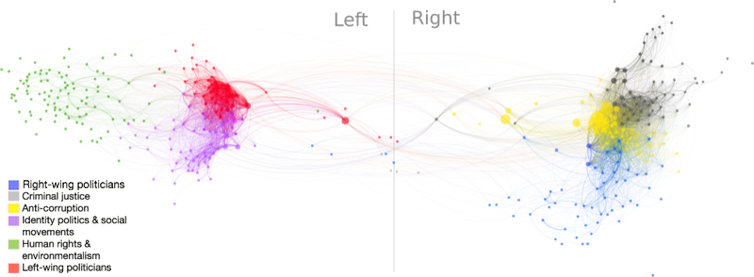
Pablo Ortellado and Marcio Moretto Ribeiro, CC BY
In August 2016, President Dilma Rousseff was impeached in a congressional vote that split down party lines. Since then, polling shows that Brazilians have only grown more polarized.
Polarization worldwide
Brazil is not the only country to have splintered along ideological lines in recent years.
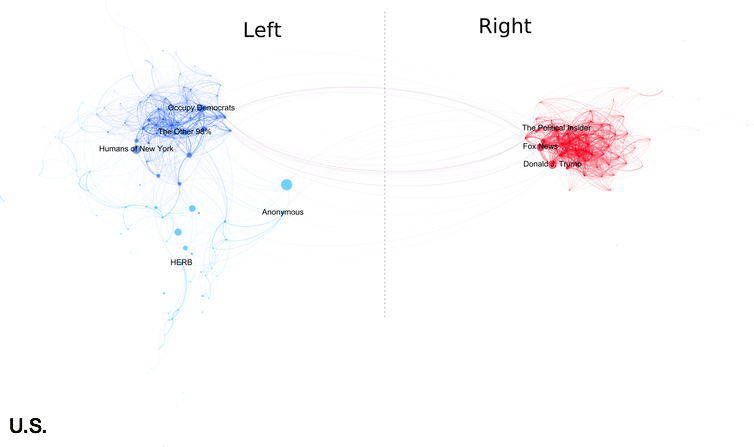
Pablo Ortellado and Marcio Moretto Ribeiro, CC BY
In 2017, we began to map the online behavior of Facebook users in other severely polarized countries using the same methodology. So far, we have completed charts for the U.S. and Argentina.
![]() Both countries look similar to Brazil these days. Right-wing and left-wing Facebook users exist in wholly different universes, not just in terms of the politicians they support but also in their social interests.
Both countries look similar to Brazil these days. Right-wing and left-wing Facebook users exist in wholly different universes, not just in terms of the politicians they support but also in their social interests.
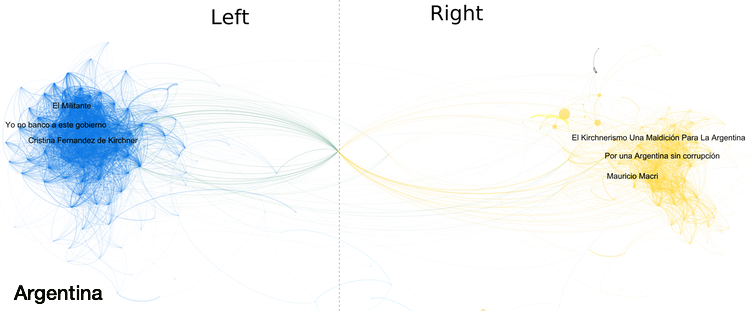
Pablo Ortellado and Marcio Moretto Ribeiro, CC BY
Pablo Ortellado, Professor of Public Policy, Universidade de Sao Paulo and Márcio Moretto Ribeiro, Professor of Information Systems, Universidade de Sao Paulo
This article was originally published on The Conversation. Read the original article.














